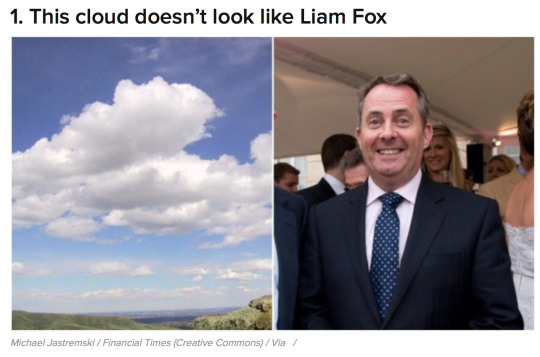Video
vimeo
Man with a Movie Camera (Cinematic Orchestra soundtrack)
More on the editing of Man with a Movie Camera (Cinematic Orchestra soundtrack) here.
0 notes
Text
Thoughts on watching the 2021 Chess World Championship
This was the first time I’d paid proper attention to chess match for a very long time. It was pretty good fun!
There appeared to be four “official”(-ish?) streams. The FIDE and Chess24 “Deep Dive” streams were of the “two extremely accomplished chess players on Zoom” variety, and were too dry for me. The most professionally produced, probably the most dumbed-down (although only relatively speaking), and my favourite, was the Chess24 “Global” stream; British Grandmaster David Howell was very good in a sort of joint presenter/analyst position. The Chess.com stream was perhaps objectively the best, and had last-time’s challenger Fabiano Caruana as analyst, but the dark set, big leather chairs, usually-all-US line-up, usually-all-male line-up and – forgive me – the presenter’s voice made it unbearably bro-y to me.
Game 6 was the obvious highlight and a tremendously exciting (and long!) game. Games 1-5 were sometimes tense to start with before resolving into failry dry draws, and Nepomniachtchi made some big errors in many of the later games.
I hadn’t appreciated before what a big deal move 40 is in structuring the game. Players have 2 hours for the first 40 moves, then get an extra hour, so if there’s time trouble it comes around move 40 (this happened most memorably in Game 6). It’s also the first place players are allowed to agree a draw. So once the opening is over, move 40 becomes the next “road marker”. On one hand, this adds some structure and a point of interest, but it does feel a bit artificial.
There’s a lot of talk (especially from Carlsen) of tightening time controls in the future. While there was a certain majesty to the 7-hours-plus of Game 6, I think on balance slightly tighter time controls would be better. But, on the other hand, panicky time scrambles at this level seem a bit artificial. I think I’d like to see the tighter time controls come with more use of increments than the “X minutes for Y moves” variety, which would tighten things on players while trying to avoid blunder-filled mad rushes.
(It’s clear in hindsight, I think, that the response to computers comprehensively pulling ahead of humans would be that the most popular forms of chess are not trying to make humans more perfect with longer time, but in fact making humans highly imperfect – and highly human – with very tight, even ridiculously tight, time controls for online chess. Nonetheless, it wasn’t what I predicted back 15 years ago, or whenever.)
The match situation after game 6 – Carlsen being ahead, Nepomniachtchi needing to catch up – seemed to have quite a big psychological effect, but didn’t really effect either player’s tactics as much as one might have expected. Maybe we just didn't get close enough to the end before it was all decided? (The obvious place where match tactics did seem to matter was the early-middlegame in game 8, where Carlsen offered to exchange quite a few pieces and Nepomniachtchi refused. This was arguably positive expected-value for Nepo, but it didn't work out, and the match was pretty lost from then.)
Viewing it as a sporting event, it was a shame how rare it was for both players to be simultaneously at the table. Nepomniachtchi in particular spent huge amounts of time away from the board, often coming back for a last check that his pre-planned move is OK, then leaving after making it. Obviously players have to be allowed to go to the loo or eat a sandwich or whatever, but at some point it was too much like computers playing each other than real people. I’m not sure if rule changes are feasible here, but I’d like to see the organisers try.
Carlsen’s personality is an interesting combination of heavy determination to be the best, a high degree of arrogance that he is the best, but also a hint that he understands the whole thing is sort of ridiculous. (Barack Obama also had this combination. Who else? Usain Bolt is too relaxed; Elon Musk isn’t serious enough; Cristiano Ronaldo isn’t funny enough. Bradley Wiggins circa 2012, maybe? Or Kanye circa 2005?)
1 note
·
View note
Text
Automated subtitles try to understand me saying “Cauchy–Schwarz inequality” in my lecture yesterday

coffee shops inequality
grocery shops inequality
coaches, France, and equality
coaches’ rights and equality
coach each rants: inequality
pushes fonts and equality
kosher smarts and equality
cushy spots and o’clock
coterie shots, if into it
cursory glance inequality
precious farts in a coffee
0 notes
Text
Yglesias on vaccine scarcity
The unit cost of these vaccines is not high. It’s maybe too high for the poorest countries on Earth. But a lot of middle-income countries that could easily afford $20 a shot for people just don’t have them, because that number of vaccines doesn’t exist. And Pfizer are not refusing – they’re selling at a profit; but this is all that they can make. What we don’t have a policy focus on is: Why is it all that they can make, exactly? […]
I feel like we have not had from the government (and journalists – but really the government) is real feet-to-the-fire “What’s up here, guys?” stuff. “Why don’t you do this? Why do you think that the amount that you’re producing now is profitable, but that the investments you would need to make to increase it dramatically wouldn’t be profitable?”
And I can think of a lot of reasons: whenever you ask this on Twitter, people come up with speculation that makes a certain amount of sense. But I want to hear it from the CEO. And the answer could be “OK, to increase production we would need to wipe out the entire population of elephants worldwide,” and we’d say, “Ugh, I don’t know about that.” But it could just be “Well, we would need to raise the unit cost to $45 a dose, and we don’t want you to yell at us about price gouging,” and then we should think about it and be like, “Well, raising the unit cost to $45 a dose: Would that be so bad? Maybe we shouldn’t yell at them about price gouging.” Maybe they need more glass to be diverted from something else; they need a federal order saying we’re not going to make any new TVs for some period of time. Who knows?
But that was wartime mobilisation: you identify actually what are the bottlenecks and then you try to resolve them, instead of just saying, “Well, we are where we are,” and we have to deal with this scarcity.
– Matt Yglesias on The Weeds podcast (episode “Boosters: Worth it or not here they come”, from 36:00)
0 notes
Text
Close tennis matches are long tennis matches
Last night, Emma Raducanu won her 19th and 20th consecutive sets at the US Open since the first qualifying round 18 days ago, and in doing so became Britain's first British woman to win a grand slam title since 1977.
It was also the first time I've watched a tennis match from first shot to last in quite a while – and probably the same for lots of other people too. And, of course, tennis scoring can be a bit complicated for the casual viewer. As someone I follow on Twitter wrote:
Whoever invented tennis scoring was definitely on acid.
— Hannah Al-Othman (@HannahAlOthman) September 11, 2021
This reminded me of a pretty famous maths problem: If you have a probability p of winning a point in tennis, what's the probability that you win a game?
Recall that a "game" is, starting from 0 ("love") the first person to 4 points (denoted, for obscure reasons, "15", "30", "40", "game"), but you must win by 2 clear points. To keep track of the two clear points, if the game gets to 40-40 (that is, 3 points each), that's called "deuce". The player who wins the next point has "advantage" ("Advantage Raducanu" or "Advantage Fernandez", calls the umpire); if they win the next point, they win the game, while if the opposing player wins the next point, it returns to deuce again.
(I say a "pretty famous" maths problem, because I remember coming across it a couple of times in my teens, probably in pop-maths books. Then in 2002, it was a question in my Cambridge entrance interview. I hadn't memorised the exact solution or anything, but I could remember enough of the general process to be able to work smoothly through to the solution without errors or needing help. I aced the question, and I got in. It's interesting to wonder in what ways my life might be different now if I hadn't come across this tennis problem before the interview. There's got to be at least a chance I wouldn't be a maths lecturer now without it.)
Game
What makes this an interesting maths problem is the "two clear points" rule, as tracked by deuce and advantage. This means that there's, mathematically speaking, no limit to how long a game might last: it could go deuce, advantage, deuce, advantage, deuce, advantage, ... (each advantage to either player) for an arbitrarily long time. (The second game of last night's Raducanu–Fernandez match had five deuces and five advantages before Raducanu broke serve.) So the non-boring part of the question is: Once you get to deuce, what then is the probability that you win the game?
Remember that p is the probability you win a point; it will be convenient to write q = 1 - p for the probability you lose a point. Let d be the probability you win the game starting from deuce. So from deuce, three things can happen:
You win the next two points, with probability p × p = p2. You then win the game.
You lose the next two points, with probability q × q = q2. You then lose the game.
You win one of the next two points: either win then lose or lose then win, with probability p × q + q × p = 2pq. You then return to deuce again, so your probability of winning the game is back to the d that you started with.
Putting all this together, we have
d = p2 + 2pqd.
We can then solve this for d, to get
d = p2 / (1 - 2pq) .
That solves the difficult/interesting part of the problem, Then it's straightforward but tiresome to turn this probability of winning a game from deuce into probability of winning the game from the start. A graph of the answer looks like this:
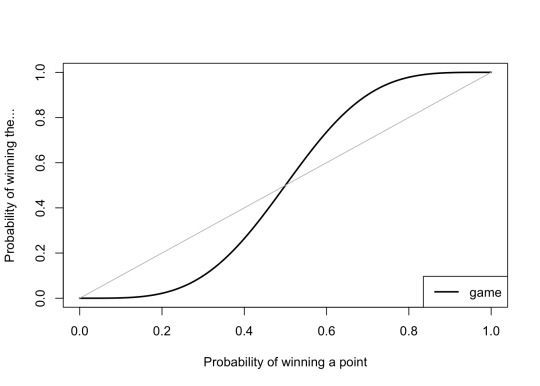
Note that having just a slightly better than 50:50 chance of winning each point gives you a much better than 50:50 chance of winning the whole game. For example, Raducanu won 54% of points last night (81 points out of 149), which would give you a 61% chance of winning each game – Raducanu actually won 63% of the games. (This is ignoring the very important issue of serving vs returning.)
Set and match
You can similarly stretch this out to a whole set, again ignoring serving/returning, which is again mathematically tiresome but not mathematically difficult. Here, the effect that a small superiority in winning points leads to a bit superiority in winning sets is even more pronounced.
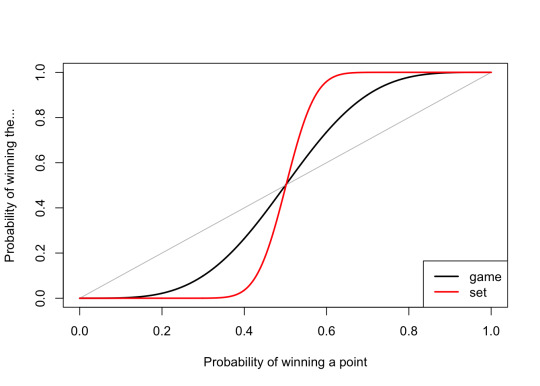
Unsurprisingly, for the whole match it's more extreme still – a 54% chance of winning a point gives you an 87% chance of winning the match, or 92% for a men's five-set match.

Close matches are long matches
So why bother with the complicated scoring. I guess the main reason is a sort of psychological one. A "first to 81 points" match would get pretty samey, and when one player is at 80 points to 68, it's pretty clear who's going to win. Instead we have the excitement of who's going to win this game, then who's going to win this set, as smaller bits of excitement within the match. It also gives a player that falls behind a chance to catch up – a 6–0 set loss is no worse that 7–6, so you pick yourself up, dust yourself off, and get started again.
But one other reason, is that ensures that matches where one player dominates are over very quickly, while tight balanced matches will go on for longer. This extends exciting close matches, and also makes it more likely that the genuinely better player will win. (A slightly worse player has more chance of snatching a lucky win in a shorter match.)
That picture shows the average number of games in a match. We see that close matches, where the probability of wining a point is close to 0.5, are the longest games, on average.
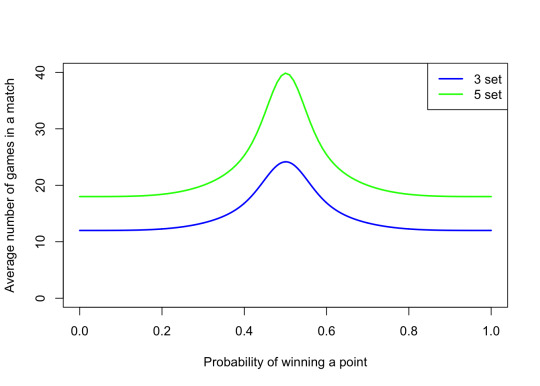
My own solution: Start playing a minimum number of points; maybe 100. From then, as soon as one player has scored n/2 + sqrt(n) points out of n, we say that they're two standard deviations above 50:50, reject the null hypothesis that p = 0.5, and declare them the winner. I don't think it will catch on.
[This article was helpful for cheacking my calculations.]
0 notes
Text
Universities should mandate the Covid vaccine
Over 700 US universities have instituted a Covid vaccine mandate. I think UK universities should do the same.
I think this for two reasons. First, universities need an extremely high level of vaccination for the next year to run well. Second, it will be difficult to get levels high enough without a mandate.
On the first point, what proportion of university students need to be vaccinated?
In the US, Rice University had to move its teaching online due to Covid outbreaks, even though 94% of students were vaccinated.
This study says that “if 90% coverage with an 85%-effective vaccine can be attained, the model finds that campus activities can be fully resumed”.
Last year was chaotic, with almost no in-person teaching. National case numbers are currently roughly nine times higher than they were at the beginning of term last September. A hugely oversimplified back-of-the-envelope calculation suggest to reduce cases nine-fold with an 90% effective vaccine requires vaccinating (1 – 1/9) / 0.9 = 98% of students.
It seems to me that universities need be aiming for getting well over 90% of students vaccinated. (Note that at the beginning of term, many vaccinated students will still only have first doses, which are less than 85 or 90% effective.) Currently, 64% of 18 to 24-year-olds in England have had one vaccine dose and 37% have had two doses – and I’d guess it’s even lower for the younger 18 to 21 sub-demographic that covers most university students. So there’s a lot of work to do here.
I should be clear: The reason we need very high levels of vaccination is not that students are personally at high risk – a typical healthy 18 year-old who catches Covid is unlikely to experience anything worse than a few days in bed. Rather, it’s that Covid outbreaks put in-person teaching at risk. Last year, my own university tried to do small-group teaching in person; yet during week 2 of term, so many students either had Covid, or were self-isolating because their housemates did, that everything had to be run twice, in-person and online, at very short notice, and the whole thing was a chaotic mess. In Week 3, we bowed to the inevitable and moved everything online, where it has stayed ever since. It’s that that universities want to avoid.
I’m glad to hear that many universities are coordinating with their local NHS trusts to get vaccines available on campus. I’m pleased to see Sussex University experimenting with a vaccine lottery. But I think that to get coverage of well over 90% we need some stick as well as the carrot.
When I say a “vaccine mandate”, what I really mean is this: it should be more inconvenient to be unvaccinated than to get the vaccine. It’s all very well bringing the vaccine truck up to the student union and giving people a free coffee or something, but that’s still more effort, at a very busy and exciting time, than just not bothering. So my “vaccine mandate” policy would be something like this:
Anyone who regularly comes on campus – student or staff – who hasn’t been vaccinated once by the start of the semester (and twice by the start of the second semester in January), must receive a negative Covid test twice a week and register it on a University website. Anyone who has neither registered their vaccination nor registered a negative test in the previous four days will be contacted to remind them not to use communal residential spaces and not enter campus except to take a test. All students may take advantage of online teaching offerings at all time.
This policy has a universal exception available for anyone who – for religious, health or political reasons, or just because they couldn’t be bothered – doesn’t wish to take the vaccine, but that keeps them and everyone else safe: regular asymptomatic testing. But critically, this is more hassle than just getting vaccinated. Note also that my policy has very lax enforcement – you’re just contacted to remind you of the rules! And I’m happy for the registration of vaccination to be very poorly protected against fraud. Again: the goal of the policy is not to make it literally impossible for unvaccinated students to smuggle their way onto campus; it’s just to make it inconvenient and annoying to be unvaccinated.
I think this is all very sensible. But vaccine mandates for universities are not just not-popular, they’re hardly discussed at all. One of the few organisation to even mention the idea is my own union, the UCU, which gives vaccine mandates a pretty casual brush-off:
Making vaccinations compulsory as a condition [for students] to access their education is wrong and would be hugely discriminatory against those who are unable to be vaccinated, and international students.
It’s so obvious that it’s “wrong” that the UCU doesn’t even need to explain why. It says it’s “hugely discriminatory against those who are unable to be vaccinated” – I agree that asking those unable to be vaccinated to take tests is a little inconvenient for them, but it keeps them safe, it keeps their colleagues safe, and it ensures they can receive the education they’re entitled to. It also says it’s “hugely discriminatory against […] international students” – I don’t see why; my entirely non-fraud-proof registration scheme will accept vaccinations performed abroad, and if international students haven’t had the chance to be vaccinated at home, we’re just asking them to pay a quick visit to the vaccine truck during freshers’ week.
Meanwhile, my own university next semester is going to be in the absurd position of mandating masks – super-annoying to wear, sometimes you forget and leave it at home, and which we think are probably a little bit effective – and not mandating vaccination – one-off inconvenience, literally in your bloodstream, and which we’re sure is incredibly, almost miraculously, effective.
0 notes
Text
Rory Stewart's hedgehog speech
youtube
Multa novit vulpes, verum echinus unum magnum. The fox knows many things, but the hedgehog knows one big thing.
I am extremely pleased to have the opportunity to respond to my hon. Friend the Member for Plymouth, Sutton and Devonport. I believe that this is the first time that Parliament has discussed hedgehogs since 1566, when hedgehogs were famously raised in relation to the attribution of a bounty of tuppence for the collection of the hedgehog throughout the United Kingdom.
The hedgehog has undergone an extraordinary evolution. 1566 seems very recent, but the hedgehog was around before 1566. It was around before this Parliament. The hedgehog, and its ancestor, narrowly missed being crushed under the foot of Tyrannosaurus rex. The hedgehog was around long before the human species: it existed 56 million years ago.
It tells us a great deal about British civilisation that my hon. Friend has raised the hedgehog. Because the hedgehog is a magical creature. The hedgehog is a creature that appears on cylinder seals in Sumeria, bent backwards on the prows of Egyptian ships. The hedgehog has of course a famous medicinal quality taken by the Romany people for baldness. And it represents a symbol of the resurrection found throughout Christian Europe. This strange animal was known, of course, in Scotland, Wales and Ireland originally in Gaelic as “that demonic creature, that horrid creature”, and is the hedgehog celebrated by Shakespeare:
“Thorny hedgehog, be not seen…
Come not near our faerie queen”,
and famously of course in Richard III there is that great moment when Gloucester is referred to as a “hedgehog”. It represents a strange decline in British civilisation from a notion of this magical, mystical, terrifying creature to where it is today – and I refer of course to my own constituent, the famous cleanliness representative of Penrith and The Border, Mrs Tiggy-Winkle.
I want to be serious for a moment. The hedgehog is of course an important environmental indicator: the hedgehog’s habitat, its ability to occupy 30 hectares of land, and its particular relationship to the hibernaculum – by which I mean the hedgehog’s ability, almost uniquely among animals in the United Kingdom, to go into a state of genuine hibernation. Its heartbeat goes from 240 a minute to only two a minute for six months a year. It has a particular diet: a focus on grubs and beetles. The street hedgehog initiative, which my hon. Friend has brought forward, reminds us that, by cutting holes in the bottom of our hedges, we can create again an opportunity for hedgehogs to move.
But the hedgehog is a bigger lesson for us in our environment. Firstly, a lesson in scientific humility. The hedgehog has of course been studied for over 2,000 years. The first scientific reference to the hedgehog is in Aristotle; he is picked up again by Isidore of Seville in the 8th century, and again by Buffon in the 18th century – and these are reminders of the ways in which we get hedgehogs wrong. Aristotle points out that the hedgehog carries apples on his spine into his nest. Isidore of Seville argues that the hedgehog travels with grapes embedded on his spine. Buffon believes these things might have been food for the winter – but as we know today the hedgehog, hibernating as he does, is not a creature that requires to take food into his nest for the winter. Our belief in Britain that the five teeth of the hedgehog represent the reaction of the sinful man to God – the five excuses that the sinful man makes to God – is subverted by our understanding that the hedgehog does not have five teeth.
Finally, the legislation introduced in this House – to my great despair – in 1566, which led to the bounty of a tuppence on a hedgehog was based on a misunderstanding: the idea that the hedgehog fed on the teats of a recumbent cow in order to feed itself on milk. This led to the death of between of half a million and 2 million hedgehogs between 1566 and 1800; a subject John Clare takes forward in a poem of 1805, and which led my own Department, the Ministry of Agriculture, in 1908 to issue a formal notice to farmers encouraging them not to believe that hedgehogs take milk from the teats of a recumbent cow, because of course the hedgehog’s mouth is too small to be able to perform this function.
But before we mock our ancestors, we must understand this is a lesson for us. The scientific mistakes we made in the past about the hedgehog are mistakes that we too may be mocked for in the future. We barely understand this extraordinary creature. We barely understand for example its habit of “self-anointing”: you will see a hedgehog produce an enormous amount of saliva and throw it over its back; we do not understand why it does it. We do not really understand its habit of aestivation – which is to say the Pushto version of the hedgehog hibernates in the summer as well as the winter; we do not understand that concept of aestivation.
The hedgehog also represents, for those of us interested in environmental management, the important subject of conflict in habitats. The habitat that suits the hedgehog is liminal land; it’s edge land, it’s hedgerows, it’s dry land. The hedgehog is not an animal that flourishes in many of our nature reserves; it doesn’t do well in peatland, it doesn’t do well in dense, heavy native woodland. The things that prey on the hedgehog are sometimes things that we treasure – my hon. Friend mentioned the issue of the badger. There is also the question of the hedgehog in the Western Isles, which relates to the hedgehog’s potential predation on the eggs of the Arctic tern.
Finally – and, I think, more positively – what the hedgehog really represents for us is an incredible symbol of citizen science. The energy that my hon. Friend has brought to the debate is a great example of British – or perhaps English – eccentricity, and it is on the basis of English eccentricity that our habitat has been preserved. Gilbert White, the great 18th century naturalist, was himself an immense eccentric. It has been preserved thanks to eccentrics such as my hon. Friend and, perhaps most famously of all, Hugh Warwick, the great inspiration behind the British Hedgehog Preservation Society. He has written no fewer than three books on the hedgehog, and he talks very movingly about staring into the eyes of a hedgehog, getting a sense of its wildness from its gaze. These enthusiasts connect the public to nature, sustain our 25-year environment programme, and contribute enormously to our scientific understanding of these animals. This is true in relation to bees, it’s true in relation to beavers, and it’s true in particular in relation to Hugh Warwick’s work on the hedgehog.
Ultimately, we need to understand that the hedgehog is a very prickly issue. The reason for that is that my hon. Friend has raised the question of adopting the hedgehog as our national symbol. Some hon. Members will remember that the hedgehog was used by Saatchi & Saatchi in an advertising campaign for the Conservative party in 1992 general election, and therefore we should therefore pay tribute to the hedgehog’s direct contribution to our election victory in that year. But I would like to challenge my hon. Friend’s assertion that the hedgehog should become our national symbol. I ask you, Madam Deputy Speaker, as I ask those on both sides of this House, because this question concerns not only one party, but all of us: Do we want to have as our national symbol an animal which when confronted with danger rolls over into a little ball and puts its spikes up? Do we want to have as our national symbol an animal that sleeps for six months of the year? Or would we rather return to the animal that is already our national symbol? I refer, of course, to the lion: majestic, courageous, proud.
If I may finish with a little testimony to my hon. Friend and to those innocent creatures which are hedgehogs, perhaps I can reach back to them not as a symbol for our nation but as a symbol of innocence to Thomas Hardy. He says:
“When the hedgehog travels furtively over the lawn,
One may say, ‘He strove that such innocent creatures should come to no harm,
But he could do little for them; and now he is gone.’
If, when hearing that I have been stilled at last, they stand at the door,
Watching the full-starred heavens that winter sees,
Will this thought rise on those who will meet my face no more,
‘He was one who had an eye for such mysteries’?
(10 November 2015. Transcript via Hansard, edited a bit. The video misses the Latin bit at the beginning, which is a shame.)
0 notes
Text
Some notes on randomness
A recent news story on Nature.com reported on "the fastest random-number generator ever built". A journalist (who is also a friend of a colleague) was also writing about this new device, and asked me if I could answer a few questions via email on randomness and its importance in computing. And so I am quoted in this article here – although since the article in Italian, I'm not sure what it says. If anyone's interested, I copy below the questions I was asked and what my responses were. If you want to point out things I said that are wrong or that I've misunderstood, I'm @mpaldridge on Twitter.
Why is randomness important for computers?
Computers use randomness for lots of things. For example, if you want a video game to be unpredictable or different each time, the developer might make things change at random – think about the random choice of which Tetris block comes next, or the random shuffling of the cards in an online card game. More importantly, statisticians and scientists use randomness to investigate the unpredictability of computer programs that model the real world, like weather forecasting or stock pricing.
A very serious way that computers use randomness is for cryptography. If a computer wants to keep some information secret, or send a message securely, it will choose a "key" – essentially like a password – at random, so that it can't be guessed.
How do we generate randomness?
There are many computer programs that can generate numbers that appear to be random. Since they're produced by a computer program, they're not truly random, but they're good enough for most purposes, like the video game or the weather forecast. But if there's something that it's very, very important is kept secret, you might be worried that an adversary could collect lots of your random numbers and work out what pattern is being used to produce them. The adversary could then "guess your password" in the future, which would be very bad.
For "true randomness" we don't want a computer program, but instead want to take advantage of the physical world. For example, you could toss a coin, or roll a dice, and that would always be unpredicatable. (Or you could take photographs of lava lamps, as in this amusing recent story.) But these physical methods are very slow – it takes a few seconds to toss a coin, and some computers (say a server running a large website) might need lots and lots of random numbers very quickly.
To get true physical randomness, but extremely quickly, we usually look towards very small-scale things, like atoms or photons (light particles). For example, you could measure the decay of the particles in some radioactive material, which is true physical randomness that can also be measured extremely quickly.
As I understand it, this new device is using the tiny microscopic random fluctuations of photons in a thin beam of light. But I don't know anything more about the physics of how it works than the article on Nature.com.
How many random numbers can this new device generate per second?
The most basic random number is just picking a 0 or a 1 at random – like tossing a coin heads (1) or tails (0). The device in the Nature article produces 250 trillion 0s or 1s per second! That's 250,000,000,000,000 coin tosses every second!
How useful is this new device?
A typical key (password) might use somewhere between 100 and 2500 of those 0s and 1s, so we're talking somewhere in the region of 100 billion to 2 trillion passwords a second! That's an enormous amount. It's so fast that computers can't process the random numbers quick enough to deal with them! I think the hope is that smaller, cheaper (and, yes, a little bit slower) versions can be made in the future, which could be useful.
But also I think the researchers wanted to show what could be done, even if there's not any immediate use for it.
0 notes
Text

“The Voyager Golden Records are two phonograph records that were included aboard both Voyager spacecraft launched in 1977. The records contain sounds and images selected to portray the diversity of life and culture on Earth, and are intended for any intelligent extraterrestrial life form, or for future humans, who may find them. The records are a sort of time capsule.”
—Wikipedia, Voyager Golden Record
“My favourite tidbit from [the Voyager Golden Records] (which I mentioned in Thing Explainer) was that they didn’t include a lot of photos of buildings. And the reasons were they figured it wouldn’t be obvious the difference between buildings or coral reefs or rock formations. If you look at a building, how do you know it’s not a crystal? How do you know it’s not a zoomed-in photo of a sponge? How do you know you’re not looking at weird geological formations or a coral structure that builds naturally with holes in the side that are square because of the material they grow from? So they didn’t include a lot of buildings because they figured it wouldn’t be clear what they were.
“But one that they did include was a suspension bridge. And the reason they gave (and Carl Sagan has talked about this) is that a suspension bridge is one of the structures that humans build, they’ve been built artificially, they don’t really occur naturally, but their structure is so completely constrained by physics that if you look at the twenty largest bridges in the world, they’re all suspension bridges and they all look the same. And the reason is as you scale them up, you converge on that one design – there’s no other way to do that. So the idea was this is a structure that, if aliens pick this up on some other planet, if they have to cross gaps in the same way we do with rivers and canyons, and if they are working with kind of the same constraints we are – they have metals or they have materials with similar properties – and if they work on making these bridges big enough, they are going to converge on a suspension bridge that looks just like ours.
“I really like this idea. Now, whenever I see a suspension bridge, I think about that: that this is the thing that, if there are alien worlds and if they build structures, this is the one thing that we’ve both tried to build. This is the thing that we have in common and that we would recognise when the other one built it.”
—Randall Munroe on The Ezra Klein Show

0 notes
Text
Things I Liked in 2018

The flowers that make Chanel No 5
I pulled a 1,500-year-old sword out of a lake ("People on the internet are saying I am the queen of Sweden. I wouldn’t mind being queen for a day, but when I grow up I want to be a vet. Or an actor in Paris.")
FILMS: Phantom Thread was 2018's lushest costume drama, swooniest romance, most giffable comedy, most twisted psychological thriller, and best film. Other very good films this year, in approximate order: Lady Bird ("It's the titular role!"), Beast, Cold War, First Reformed, A Fantastic Woman, Faces Places, Shoplifters | The best thing about moving to Leeds so far was the Leeds Internation Film Festival; my favourites there were Birds of Passage (like if The Godfather was set among the Wayuu people of north Colombia), Shoplifters again, Colette | The two best films I saw this year were the re-release of 2001: A Space Odyssey (if we rank films purely on what cinema can do that other art forms can't, this is perhaps the greatest film of all time) and the re-release of Vertigo (this was about my fourth or fifth time seeing it – first on the big screen – and I think I finally got it). Plus I saw at the Watershed in Bristol (which I miss) Do the Right Thing and The Battle of Algiers, which are both excellent | I went to the cinema 89 times this year, which is roughly 1000% more times than I went last year. General endorsements: Go to the cinema more often. Sit one row closer to the screen than you think you want to. | It's not exactly a film, but I saw about four and a half hours of The Clock (Wikipedia, The New Yorker) at the Tate Modern, and it's completely riveting in an unusual way | The most nail-biting short film of 2018 was this:
Today as I was walking home after my run I saw a large lemon rolling down the hill. It kept rolling for about a quarter mile. And now you can see it, too. pic.twitter.com/dQoHi4RrXS
— Mike Sakasegawa (@sakeriver) July 11, 2018
On printer jams and the people who try to solve them
Conflict theory vs. mistake theory | Grifters vs. grafters
TV: My two favourite series were deliciously good fun on the outside and, in different ways, kind of clever and important on the inside: Killing Eve and A Very English Scandal | I would recommend Stephen, the terrific and harrowing documentary about Stephen Lawrence, his murder, and what came after, but I don't know any way to watch it legally | I know you thought Collateral was bad because it was preachy and obvious, and I don't really have a good counterargument, but I just liked it (although it's no State of Play) | Last Week Tonight
The White Darkness – David Grann writes about Henry Worsley's solo track across the Antarctic
Check out the big brain on Brett pic.twitter.com/3nH4hxENzI
— oscarboyson (@ohboyson) September 28, 2018
Lauren Collins on the royal family has more delightful sentences than anything else I read this year
In memoriam: Helen Rosner remembers Anthony Bourdain | Zadie Smith remembers Philip Roth
youtube
MUSIC: Best album: Chris by Christine and the Queens, with 2012–2017 by Against All Logic and so sad so sexy by Lykke Li as runners-up | Best singles: Nobody by Mitski and Noid by Yves Tumor | Best video/song which I feel bad about recommending because it's actually an advert: Spike Jonze x FKA twigs x Anderson .Paak [above] | Best film soundtracks: Phantom Thread by Jonny Greenwood, A Fantastic Woman by Matthew Herbert, You Were Never Really Here by Jonny Greenwood again, edited highlights from Suspiria by Thom Yorke | My favourite music writing: Rob Sheffield on Radiohead live in New York | a playlist
"I will admit that I am not well. That writing this, right now, I am not well. This will colour the writing. But it is part of why I want to write, because another part of the problem is that we write about it when we are out the other side, better. And I understand: it’s ugly up close; you can see right into the burst vessels of the thing. (Also, on a practical level, it is difficult to write when one is unwell.) But then what we end up with has the substance of secondary sources."
Taffy on Goop
I cried on the train reading this essay by Junot Diaz, but I also believe the people quoted in this story | Asia Argento's speech at Cannes was just one minute long and took my breath away, but there's also this story

PODCASTS: Slate's Culture Gabfest – for example, on the dad joke [36:15] | Adam Buxton interviewing Paul Thomas Anderson is very good because no one else would dare open with "The reason I liked There Will Be Blood so much is that Daniel Day Lewis used a funny voice" | This American Life: Five Women, on libraries | Unpopped on Come Dine With Me | The New Yorker Radio Hour: an hour on Phillip Roth, 15 minutes weeding with Parker Posey | The BBC's radio adaptation of Lucy Prebble's play The Effect, although I can't find it online anywhere | Reply All: Negative Mount Pleasant | You don't need me to tell you whether you want to listen to Stephen Fry on No Such Thing as a Fish or would rather gnaw your own arm off
Six Glimpses of the Past by Janet Malcolm (although perhaps you have to be a pre-existing Malcolm fan for this one)
Cat Power is my favorite musical artist named after two kinds of nap.
— Lauren O'Neal (@laureneoneal) April 5, 2018
SPORT: I took the day off work to watch Stage 19 of the Giro d'Italia, which turned out to be a good decision | It seems like another lifetime, but apparently England v Colombia in the World Cup was only six months ago
I have no idea if it's fair, but this pan of Jill Soloway's book by Andrea Long Chu is a dark delight
OLD THINGS I CAME ACROSS THIS YEAR: Kate Bush's The Dreaming is so good that it's definitely in the top four Kate Bush albums | Play It As It Lays by Joan Didion, which I preferred to her more famous nonfiction | Consider the Weasel is, sadly, not the title of this Annie Dillard essay | The original pre-release version of Bob Dylan's Blood on the Tracks (Alex Ross, Spotify)
Fact-checking with Daniel Ratcliffe
Previously: Things I liked in 2017, 2016, 2015, 2014
View this post on Instagram
A post shared by Stella • Labsurdity Dogumented (@dognamedstella) on Oct 24, 2018 at 5:46pm PDT
1 note
·
View note
Text
Things I Liked in 2017
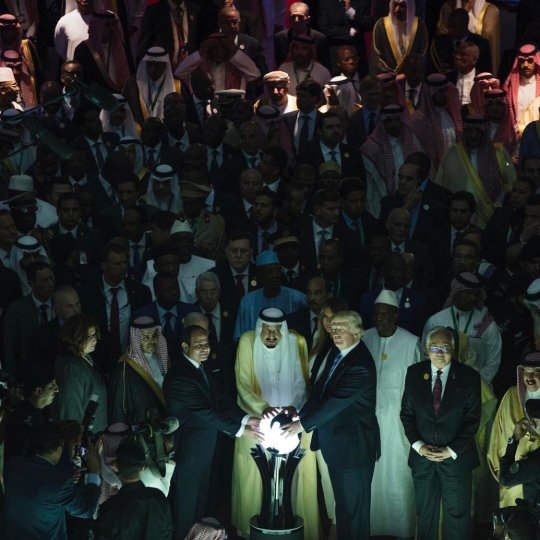
#Corbynjokes
"The other night, I pretended I didn’t know who Slavoj Žižek, the Slovenian Hegelian Marxist and cultural critic, was."
FILMS: Many good ones! #1: Tower, a documentary(ish) about a shooting at the University of Texas in 1966: the most interesting documentary of the year, the most formally inventive art film, and the most thrilling thriller. #2 Lady Macbeth: it's formal and austere except when it's extremely not; Florence Pugh is very good. #3 and 4 in some order: Call Me By Your Name (the Michael Stuhlbarg speech! the Sufjan Stevens song at the end!) and Elle (the self-consistent reading is "Paul Verhoeven thinks this is all a joke", so you have to go for inconsistent readings). Also very good: The Handmaiden, mother!, Raw, Toni Erdman. Also also good: Dunkirk, Get Out, La La Land, Manchester by the Sea, Moonlight. | I saw five films in a day at the Watershed's Cinema Rediscovered festival; my favourites were Daughters of the Dust (not really like any other film I've seen; you should watch it) and Sweet Smell of Success ("I'd hate to take a bite outta you. You're a cookie full of arsenic." I slightly embarrassingly gasped out loud at cinematography at one point.)
A delicious profile of George Osborne, of all people
Reporting from Puerto Rico in the aftermath Hurricane Maria
Mark O’Connell reviews a book about sleep
Look at this picture of a piglet. And … SURPRISE. pic.twitter.com/GzLahnb548
— SimonNRicketts (@SimonNRicketts) March 15, 2017
In memoriam: Maryam Mirzakhani | Adam West (and Adam West's Batman)
On sandwiches and the business of sandwiches The specific vocabulary here is delightful: Carriers and barriers! Goblin cave! Skillet! The drop! Mouth feel! Day parts! The fragmentation of the evening occasion!
A journalist visits North Korea – I'm not sure if this left me less worried or more worried
youtube
MUSIC: Best album: My favourite album this year is Dirty Projector's self-titled – although despite how much I enjoy its inventiveness, as a break-up album it's somewhere between bitter and just unpleasant. (Carl Wilson writes about this beautifully and insightfully but, for me, too generously.) Perhaps best enjoyed alongside the sort-of other half, Amber Coffman's City of No Reply. Also liked Room 29 by Chilly Gonzales and Jarvis Cocker – I admit (slightly sheepishly) in both cases to having preferred their broadcast work to their music in the past, but this is very good. Also also good: Arca's self-titled (far better than the Björk album, on which he worked); the new Feist, whose post-making-catchy-pop-hits career is underrated. | Best song: Sober II (Melodrama) by Lorde or Dangerous by The xx | Best review: Laura Snapes on Ed Sheeran | Most first-four-seasons-of-The-West-Wing in-jokes: Lin-Manel Miranda's What's Next? | The Radiohead section: OK Computer is best (and most underratedly funny) reissue, Lift [above] is best video, Man of War is the old song I'm most pleased to see finally released (although I'll eat my hat if it was recorded more than a couple of years ago). Radiohead live at Old Trafford was my favourite anything of last year, although it's hard to say why – I've seen them play about eight times, and this was not the best (indoor gigs are better than outdoor, for starters!), but something about it was important to me. Cried three times – at old songs, which is bad for my hipster cred. | a playlist
"They change your words, the New York Times/They may not need to, but they do"
Rachel Kaadzi Ghansah on Dylann Roof
youtube
"I work from home"
TV: Black Mirror, although I haven't seen them all yet. The Last Week Tonight YouTube page?
I can't honestly say that everyone should want to read a 17,000-word article about the Texas state legislature, but if you do, this, by Lawrence Wright, is a very good one
PODCASTS: Many good ones again! Radiolab on jury nullification and playing the Oliver Sacks tapes | Sporkful: In search of the Aleppo sandwich | Heavyweight in general, and the Isabel episode in particular | Malcolm Gladwell's Revisionist History: Golf is bad! | Reply All tracks down a phone scammer (part 1, part 2) | Surprisingly great interviewer/interviewee combination: Adam Buxton/Zadie Smith | Unsurprisingly great interviewer/interviewee combination: Ezra Klein/Tyler Cowen | This American Life has, all year, had the best sideways-on coverage of US politics | Short serieses: S-town, Jon Ronson's Butterfly Effect | Slate's Culture Gabfest, as always
Where’s Pierogi?
Kathryn Schulz on losing and loss
Caity meets The Rock
BOOK: Dreaming the Beatles by Rob Sheffield is whatever the opposite of impartial, well-balanced biography would be. It delighted me as much when it was outrageously wrong as when it surprisingly (and equally outrageously) right. Tyler liked it.
What happens when the Queen dies?
On Weinstein and related matters: Asia Argento (quoted by Ronan Farrow), Lucy Prebble, Ellen Page, Salma Hayek, Lupita Nyong'o, Dahlia Lithwick.
hey i just met you
and you're a white whale
but here's my number
so call me ishmael
— dave coates (@davepoems) December 16, 2017
Sam Anderson profiles the nonfiction writer John McPhee
OLD THINGS I CAME ACROSS THIS YEAR: Films of the French "new wave". The best: Breathless/À bout de souffle – if you'd been, say, twenty in 1960, I don't see how it wouldn't have changed you life. Other favourites: Umbrellas of Cherbourg, Jules et Jim, Hiroshima mon amour, Contempt/Le mépris. | When it was on Channel 4 in 2013, the main thing a remember hearing about the French series The Returned was that it's about zombies. Turns out that is not at all true, and it's very good. | The 9/11 memorial, although I'm not quite sure what to say about it | OLD THINGS I RE-CAME ACROSS THIS YEAR: My favourite reading experiences this year were re-reading experiences. We remember Nineteen Eighty-Four for the politics and vocabulary stuff (although I forgotten "down the memory hole" was from here), but it's also great as a straight-ahead genre thriller. Roald Dahl's The Witches, which I read back in my childhood bedroom with nothing else to read, remains excellent, especially the ending.
Cat Person!
Winners and Losers of the Recent Nuclear Holocaust
Previously: Things I liked in 2016, 2015, 2014
0 notes
Text
Things I Liked in 2016

Mark O'Connell reviews a book of Gerry Adams's tweets
Janet Malcolm profiles the pianist Yuja Wang
FILMS: The best things I saw in the cinema this year were old. Shoah, Claude Lanzmann's nine-hour documentary about Holocaust is imperfect but essential. Four scenes that will stay with me for a very long time: the bartender pouring drinks ("Mr Oberhauser, do you remember Belzec?"); the letter about the trucks ("the following technical changes are needed"); the scene in the barber shop ("We must go on"); the final scene ("I'm the last Jew"). Alfred Hitchcock's The Birds is underrated, if it's possible for a Hitchcock film to be underrated. I like Geoff Dyer's take on the film – I don't believe it for a moment, but I don't think he does either. But more than these two films specifically, this should be taken as a general recommendation of watching old films in the cinema. | Of new stuff, I'd pick Arrival or the one-shot Victoria
Citizen Khan is the best piece about a murdered Afghan Muslim tamale vendor in mid-century Wyoming I read all year
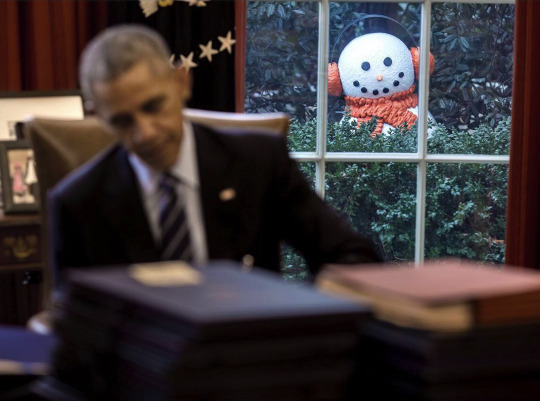
TV: O.J.: Made in America is about two things: OJ Simpson, and everything else. Here, "everything else" includes sport, economic inequality, law enforcement, television, celebrity, capitalism, politics, misogyny (although perhaps insufficiently so), drugs, journalism, the legal system, and, of course, race. It's seven-and-a-half hours long, and it's barely long enough. | By being the funniest thing I saw all year, Fleabag tricked me into thinking it wouldn't also be the most tragic. | The "San Junipero" episode of Black Mirror | The last ever episode of Stewart Lee's Comedy Vehicle was also the best. | The SNL "Black Jeopardy" sketch
I made this because I thought it was funny, although no one else did.
David's Ankles ("The first thing to hit the floor is his bent left elbow, the arm that holds the heroic sling, and it bursts along the lines of its previous breaks, old scars left over from an incident in the 16th century involving an unruly mob and a bench. Then the rest of the marble will meet the floor, and the physics from there will be fast and simple: force, resistance, the brittleness of calcite crystals, the shearing of microscopic grains along the axes on which they align. Michelangelo’s David will explode.")
youtube
MUSIC: Best album: Predictably, I choose Radiohead's hyphenlessly-titled A Moon Shaped Pool (runners-up: Bon Iver's 22, A Million and PJ Harvey's under-praised The Hope Six Demolition Project) Joint award for best single/best video: six-way tie between Burn the Witch [above], Lazarus, Drone Bomb Me, Fuck with Myself, Voodoo in My Blood, Nobody Speak | Best thematically related (?) reissued albums: Illinois by Sufjan Stevens and Boys for Pele by Tori Amos | Best Eurovision song contest-winning song about the historical geopolitics (and obliquely about the current geopolitics) of the Crimea: 1944 by Jamala | Best musical sung in the style of (and by the cast of) a different musical: Hamilton/Sweeney Todd | a playlist
BOOKS: The Lonely City by Olivia Laing (excerpt) | When in French by Lauren Collins (excerpt)
"Your Honor, if it is all right, for the majority of this statement I would like to address the defendant directly."
The Queen getting excited by cows has kept me amused today. pic.twitter.com/8ht0yDFwOJ
— SimonNRicketts (@SimonNRicketts) June 20, 2016
PODCASTS: This American Life at a Greek refugee camp (part 1, part 2) | The Reply-All phone-in show | Short clips from The New Yorker Radio Hour: at a high-school mock election (part 1, part 2); meeting a bee-stylist | Malcolm Gladwell's Revisionist History on the Toyota acceleration scandal | The Slate Culture Gabfest: for example, this discussion of names (from 33:30), or Dana's Bob Ross endorsement (from 57:00)
Christine Who Fed the Hungry: Emily Gould on volunteering in a New York soup kitchen, and the woman who ran it
"I Cooked Jeremy Corbyn’s Marrow Recipe And Had Some Thoughts About The Labour Party"
We didn't start the fire
It was always burning since the world's been turning pic.twitter.com/9LIb6qbdn8
— #JAMWAH2017 (@JAM_WAH) December 18, 2016
New Yorker writers' encounters with Shakespeare. (I think I've put too many New Yorker links in this list, but it's too late now...)
OLD THINGS I CAME ACROSS THIS YEAR: Homage to Catalonia by George Orwell (Some unrequested advice: read Appendix I in its original place, and don't bother with Appendix II) | "Scorpio sphinx in a calico dress" | "Golden age" Hollywood films, which I"m arbitrarily defining to be sound films before 1965. Some favourites in approximate light-to-dark order: It Happened One Night (feather-light), The Philadelphia Story (James Stewart is funny drunk), everything by Howard Hawks, The Wizard of Oz (perfect), Casablanca (almost as good as To Have and Have Not), everything by Alfred Hitchcock, Double Indemnity ("There was no way in all this world I could have known that murder sometimes can smell like honeysuckle"), All About Eve (better than Sunset Blvd), On the Waterfront (Marlon Brando and Eva Marie Saint are excellent), In a Lonely Place (super-depressing ending). | A Manifesto from People Reluctant To Kill for an Abstraction
Notes on dancers by Zadie Smith
Found Sonnet: The Wig by Rita Dove | Elegy for Pedals (the walking bear) by Michael Robbins
Previously: Things I liked in 2015, 2014
0 notes
Text
“I’m much more interested right now in Mike”
An excerpt from Donald Trump’s speech today introducing Mike Pence as his running mate.
Now, I think, if you look at one of the big reasons that I chose Mike – and one of the reasons is party unity, I have to be honest. So many people have said party unity. Because I'm an outsider. I want to be an outsider. I think it's one of the reasons I won in landslides. I won in landslides. This wasn't close. This wasn't close. No, this wasn't close. This was in the history of the Republican Party – history – with 17 people running, you have to understand; other people ran against one, two, and three; there were 17 – we got (I say we, because I'm the messenger, I'm a messenger; I'm doing a good job, but I'm a messenger) we got almost 14 million votes. That's more than any other person in the history of the Republican Party in the primary system running for president. To think of it! That's more than Ronald Reagan, who we love; that's more than Richard Nixon; it’s more than Dwight D. Eisenhower (you know, he won the Second World War, in all fairness; it’s pretty good); it's more than the Bushes. But I mean by a lot! I don't mean by a little. But that's with 17 people! People don't over-say that. That means our message is unbelievable. And I want to thank all of the loyal people, because I have such loyal, unbelievable people. And they displayed that just yesterday in Cleveland – where it's going to be so amazing. But they displayed it. It was on display, where we had this group of people, who many of whom I've known, and … I won't say, because for party unity I'll say they're wonderful people, OK? “Never Trump,” they said. “Never Trump. Never Trump. Oh, we're going to win.” They got crushed! And they got crushed immediately. Because people want what we're saying to happen. They're tired of a country that has horrible trade deals, that has no borders, that has taxes that are through the roof – highest taxed nation, just about, in the world – that has regulations that don't allow you to start a business and destroy your business if you do start. And, by the way, speaking of destroying businesses, we're going to take care of the miners, and we're going to take care of the steelworkers. We're going to put them back to work. So they're very tired of it. But I want to thank all of those people that – delegates – that were on the different committees, because, boy, was that something! Did we show them something! And, unfortunately, the vote was very late. But essentially, we had 112 to 12. This was the vote that was going to put it onto the floor and we're going to have a big fight. We're not going to have a fight. People agree with what we've – they want the wall. They want the borders. They want these things to happen. And what we're doing – and what we're doing that I'm so proud of, so proud – and nobody else would even think about doing it; I fought very hard for it – we'll call it the Johnson Amendment, where he took away from the evangelicals – and I want to thank the evangelicals, because without the evangelicals, I could not have won this nomination. The evangelicals have been unbelievable. I dominated with the evangelicals. A lot of people were surprised. They say, “He's not perfect.” But you know what? They know I'm going to get the job done, and they're really smart. And I said – and I said, for the evangelicals, that we're going to do something that nobody's even tried to do. You have the Johnson Amendment, passed by Lyndon Johnson and his group – and he was a powerful president; he knew how to get things done. He got bogged down in a war that was a disaster and it destroyed him. But he was a powerful president. And we call it the Johnson Amendment, where you are just absolutely shunned, if you're evangelical: if you want to talk religion, you lose your tax-exempt status. We put into the platform: we're going to get rid of that horrible Johnson Amendment. And we're going to let evangelicals, we're going to let Christians and Jews and people of religion talk without being afraid to talk. I saw this. I had so many great leaders so many times up to my office: the top, the absolute top evangelical leaders, Christian leaders, Jewish leaders; believe it or not, some Muslim leaders – people are going to be surprised to hear that. I had the top leaders up to my office, and I said, “Why is it that you're so powerful as an individual, and yet when you get out there, you're sort of timid?” And they didn't know how to answer the question. And it took two, three meetings before I figured it out. One great, great gentleman – that everybody knows, but whose name I will not reveal – said, “Mr. Trump, we live in fear in our churches and our synagogues. We live in fear that we're going to lose our tax-exempt status if we say anything that's even slightly political.” And I looked out the window – I was in Trump Tower – and I pointed to people walking down the street. I said, “Well, they have the right to speak, but you don't. That means they're more powerful than you are. We have to do something about it. How did it start? How did it start?” And they said, “It started because of Lyndon Johnson.” And he actually had a problem in Texas with a certain religious leader. And he did this, and he got it done. And we're going to undo it. So that religious leaders in this country, and those unbelievable people – and not because they backed me in such large numbers – but so that religion can again have a voice. Because religion's voice has been taken away. And we're going to change that, OK?
All right, back to Mike Pence.
So, one of the primary reasons I chose Mike was I looked at Indiana – and I won Indiana big. Remember, Indiana was going to be the firewall. That's where Trump was going down. They agreed I'd win New York, I'd win Pennsylvania, I'd win all these places. But Indiana was going to be the firewall. So I got to study Indiana, and I got to study New York, and a lot of other places, and I saw how NAFTA, signed by Bill Clinton, has drained our manufacturing jobs – just drained us, like we've never been drained before. NAFTA: again, signed by Bill Clinton. NAFTA is the worst economic deal in the history of our country. Manufacturing down in some states 55, 60 percent. It's a horror show! Moving to Mexico, moving to other places. I have a friend who's a great builder. What he builds is plants; that's all he does, is build plants. He doesn't build buildings, he doesn't – he builds plants. It's the biggest in the world, from what I hear. I said, “How's business?” I was with him the other day. “How's business?” He goes, “Unbelievable.” I said, “Really, wow, I'm surprised. Why is it unbelievable?” Because I think of him as building in this country. He says, “Donald, what we're doing in Mexico, you won't believe.” I said, “What do you mean?” He said, “We’re building plants in Mexico the likes of which we've never seen.” I said, “What about this country?” “Not much. Not much.” That's the expression. He said exactly that. “Not much.” I said, “But Mexico?” He said, “You've never seen anything like it. It's incredible.” Folks, that's gonna stop. We're gonna go reverse it. We're gonna bring our jobs back to this country. We can't be the stupid people anymore, OK? And he was better than a pollster, he's better than a consultant. I would say, “How are we doing?” and you get a big report that costs you millions of dollars. (Doesn't cost me millions; me, I give them ten thousand dollars, OK? It costs other people millions. It costs other campaigns millions to get a report. Every time they get a report, it's millions.) But I'll tell you what, a guy like this is better than anybody you can hire to do a report. And he said it. He didn't say it from the standpoint of he's upset about it. Just fact. “How are we doing?” “Unbelievable, in Mexico.” In fact, he actually said, “I’ve never ever seen anything like it.” And if you look, Ford is building massive plants there instead of Michigan. We want them to build them in Michigan. They're going to build them in Michigan. And you know that I know how to do that. So easy, so easy. But they're not going to do and they're not going to take advantage of us without retribution. There are consequences when you fire thousands of people and move to another country and then think you're going to make your product and sell it in here, there are consequences. And those consequences are going to keep companies in our country. It's very simple. And everybody here knows what the consequences are … but I won't say that because I'm much more interested right now in Mike.
(Based on a transcript by the Washington Post and video from NBC News.)
0 notes
Text
In Memoriam, J.F.K.
by Jorge Luis Borges
This bullet is ancient.
In 1987 it was shot at the President of Uruguay by a kid from Montevideo, Arredondo, who had spent a long time without seeing anyone, so it would be known he acted alone. Thirty years earlier, the same projectile killed Lincoln, by the criminal or magical work of an actor, transformed by the words of Shakespeare into Marcus Brutus, Caesar’s assassin. In the mid-seventeenth century, vengeance used it to put to death Gustavus Adolphus of Sweden, in the midst of the public massacre of battle.
Earlier, the bullet was other things, because Pythagorean transmigration is not solely reserved for mankind. It was the silk cord that received Viziers in the Orient; it was the rifles and bayonets that destroyed the defenders of the Alamo; it was the triangular blade that slit the throat of a queen; it was the dark nails that pierced the flesh of the Redeemer, and the wood of the cross; it was the poison that the Carthaginian chief kept in an iron ring; it was the serene cup drunk one evening by Socrates.
At the dawn of time, it was stone that Cain threw at Abel; and it will be many things that today we can’t even imagine, and that will be able to put an end to men and their prodigious, fragile destiny.
1 note
·
View note
Text
Things I Liked in 2015

A Selection of Jokes About the Pope's Momma
What it's like to lose $225,000 on Who Wants to be a Millionaire
FILMS: It's not original to say that Carol was great, but three underrated parts: Sarah Paulson, the music, the ending. | Ex Machina, because I'm a sucker for sci-fi chamber pieces like this, and because the dancing scene was the greatest single scene this year by a mile. | Honorable mentions: The Look of Silence, Birdman, The Lobster, the final wedding segment of Wild Tales.
The earthquake piece you've probably already read
As I'm one of Britain's leading ornithologists, here's a guide to some birds you might see in your garden this summer pic.twitter.com/SFQ5U0xRM7
— joe heenan (@joeheenan) June 8, 2015
Strunk and White: Grammar Police
TV: I thought The Jinx would be the runaway winner of the best true crime documentary short series award, but then Making a Murderer came along at the end to make it a tie. | Farewell to Mad Men, probably my favourite (long/American) TV series from beginning to end. Some favourite moments: what you call love, carousel, litter, lawn mower, dancing, roller skating, ...
Two pieces by Dana Stevens, Slate film critic (and culturegabfester) : on watching films with her daughter; on visiting Japan and finding films there
youtube
MUSIC: Best album: Björk's Vulnicura, especially the magnificent first half. Review by Carl Wilson ("The fact that time does heal is merciful but also reducing. It renders our past losses unjustly banal."); interview with Jessica Hopper. (Runners-up: Natalie Prass, Tame Impala, Sufjan Stevens, Grimes) | Best singles: "The Blacker the Berry" by Kendrick Lamar, "Dreams" by Beck, "REALiTi" (demo over album), "Seesaw". | Best EP: FKA twigs [above] (runner-up: Nao) | Best video: FKA twigs [above] (runner-up: Nao) | Best rejected Bond song: "Spectre" | Best Bach prelude played on boomwhackers: No. 1 in C major | Best cast recording of a Broadway musical based on the life of a US treasury secretary: Hamilton | A playlist
Janet Malcolm on Joseph Mitchell – I disagree with most of this, and it's still great. (For a start, Joe Gould's Secret is better than The Bottom of the Harbor.)
How different popsingers sang the national anthem at the Superbowl
PODCASTS: Love & Radio: The Living Room | Mystery Show: Britney | This American Life: on a winner of the green card lottery and on school desegregation | No Such Thing As a Fish | Slate's Culture Gabfest, especially Dana's nutmeg endorsement (from 48:01)
"Blood Ties" is just a very well done crime piece
Trump lolz: [1] [2] [3]

Remarks by the President in Eulogy for the Honorable Reverend Clementa Pinckney (Go from 18:08 – "This whole week, I’ve been reflecting on this idea of grace" – if you must, but don't just skip to the end)
OLD THINGS I CAME ACROSS THIS YEAR: "Doubt" by William Finnegan, which seems sort of Serial precursory | "Eyes of a Blue Dog", a short story by Gabriel García Márquez | Pastel Blues by Nina Simone, although Little Girl Blue will always be my first love | Sheila Heti's How Should a Person Be? | The films of Howard Hawks: His Girl Friday and Bringing Up Baby are perfect romantic comedies; To Have and Have Not has relegated Casablanca to my second-favourite Humphrey Bogart film set mostly in a bar in a Vichy-controlled French overseas territory during the second world war; Only Angels Have Wings is good but perhaps a smidgen overrated; The Big Sleep is beautiful, moody, and thoroughly incomprehensible; Ball of Fire is fun and Barbara Stanwyck terrific in it.
"Above all, I have been a sentient being, a thinking animal, on this beautiful planet, and that in itself has been an enormous privilege and adventure."
"Each Day Unexpected Salvation (John Cage)", a poem by Anne Carson | "This Poem Will Blow Your Tits Clean Off", a sonnet by @L_M_C
Previously: Things I Liked in 2014
0 notes
